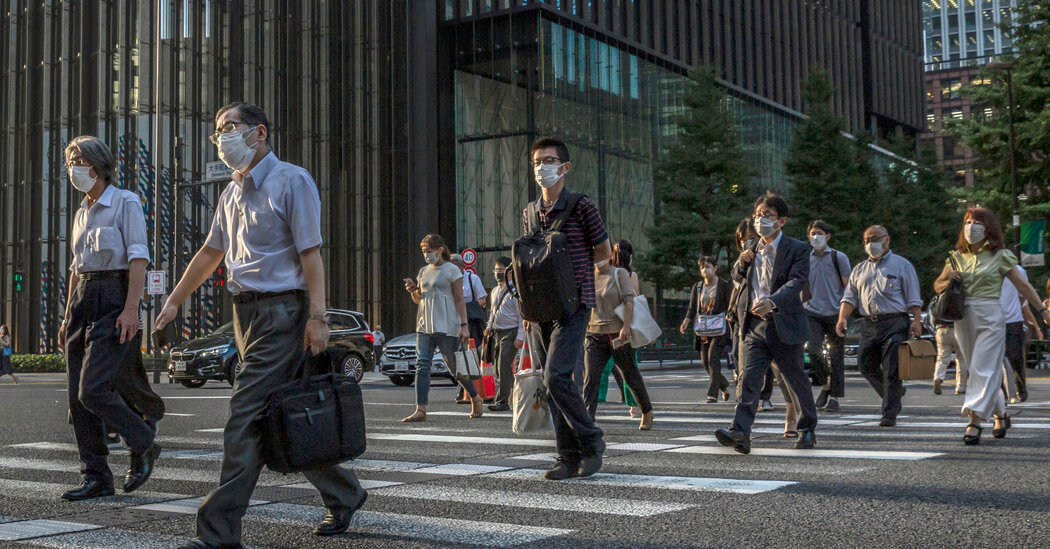TOKYO — Japan stepped back into economic growth in the second three months of 2021, but prospects for a more robust recovery looked dim as the country grappled with its worst coronavirus outbreak since the pandemic began.
The country’s economy, the third-largest after the United States and China, grew at an annualized rate of 1.3 percent during the April-to-June period, recording a quarterly increase of 0.3 percent. The expansion followed a quarter-to-quarter drop of 0.9 percent in the previous three-month period.
Even as other major economies have roared back to life, Japan’s has been stuck in a cycle of growth and contraction as the country has struggled with a persistent spread of infections that has kept its shops, bars and restaurants under constricted schedules.
Currently, case levels in Japan are at record highs. The country reported almost 18,000 new infections on Sunday, with nearly 4,300 in Tokyo, which entered its fourth state of emergency in July. The declaration has since been expanded to cover the country’s other major economic centers.
Just over 36 percent of the population is fully vaccinated, well behind the levels in most other developed nations, and analysts say that the economy will not recover until a large majority of the country has received its shots.
Japan just emerged from a “state of emergency from late April to May that damaged consumption significantly,” said Tomohiro Ota, a senior economist at Goldman Sachs in Japan. But “consumption recovered in June, which improved G.D.P.,” he said, adding that the result was better than analysts had expected.
The country’s slow start in vaccinations has left it struggling to regain economic momentum, even as other countries like the United States and China have seen their growth rocket as people come out of isolation and return to workplaces and shopping centers. G.D.P. in the United States grew 1.6 percent in the second quarter, for an annualized increase of 6.5 percent.
The recoveries in countries like the United States and China have helped Japanese exports bounce back from their nadir in the early stages of the pandemic, but Japanese consumption levels remained weak.
In the first three months of the year, “business dropped because of the state of emergency and the spread of infections, and the recovery in the second quarter has been sluggish, meaning that we’re in a slump. Growth is stagnating,” said Yoshiki Shinke, chief economist of the Dai-ichi Life Research Institute.
Japan saw a burst of economic activity in the second half of 2020, with two consecutive quarters of growth, as consumers returned to empty restaurants, bars and theaters and began to crisscross the country on trips underwritten by a government recovery plan.
Daily Business Briefing
Updated
Aug. 17, 2021, 8:02 p.m. ET
But the winter brought an increase in coronavirus cases, and since then, the country has continued to seesaw between opening up and closing down. The measures are largely voluntary, and each iteration has been less effective at keeping people home. But even so, they have powerfully suppressed economic activity in Japan, which even before the pandemic was struggling to produce more than modest levels of growth.
Now, recovery will depend on whether the government’s vaccination program and other efforts can control the virus’s spread. The country is giving over a million shots a day. If it can keep up that pace, it will top vaccination levels in the United States and Britain by early autumn.
But the appearance of the more contagious Delta variant in Japan raises the possibility that the country may no longer be able to keep the virus at manageable levels. Case numbers have raced up since July, with no end in sight, as control measures seem to have lost their potency.
With people tired of limiting their daily activities and less willing to stay home, Japan may have to make a “qualitative” change to its virus control tactics, such as putting stricter curbs on business activity, said Mr. Ota, the Goldman Sachs economist.
“The current state of emergency can’t really contain people and mobility,” he said, adding that “one possible kind of risk is that the government decides to tighten the regulations once again,” with a correspondingly large impact on consumption.
If the vaccine program proceeds apace, however, Japan “will return to normal economic activity,” said Keiji Kanda, a senior economist at the Daiwa Institute of Research.



